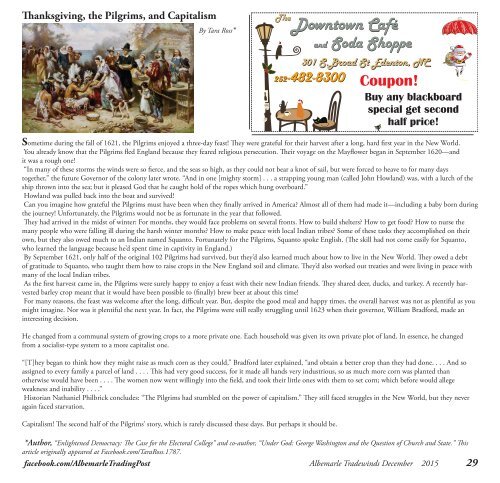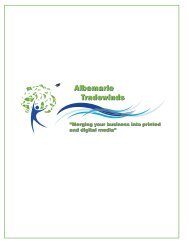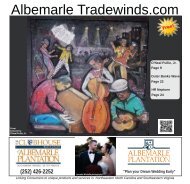Final Web December 2015 Web
December 2015
December 2015
Create successful ePaper yourself
Turn your PDF publications into a flip-book with our unique Google optimized e-Paper software.
Thanksgiving, the Pilgrims, and Capitalism<br />
By Tara Ross*<br />
<br />
<br />
<br />
<br />
<br />
<br />
<br />
<br />
<br />
Sometime during the fall of 1621, the Pilgrims enjoyed a three-day feast! They were grateful for their harvest after a long, hard first year in the New World.<br />
You already know that the Pilgrims fled England because they feared religious persecution. Their voyage on the Mayflower began in September 1620—and<br />
it was a rough one!<br />
“In many of these storms the winds were so fierce, and the seas so high, as they could not bear a knot of sail, but were forced to heave to for many days<br />
together,” the future Governor of the colony later wrote. “And in one [mighty storm] . . . a strapping young man (called John Howland) was, with a lurch of the<br />
ship thrown into the sea; but it pleased God that he caught hold of the ropes which hung overboard.”<br />
Howland was pulled back into the boat and survived!<br />
Can you imagine how grateful the Pilgrims must have been when they finally arrived in America? Almost all of them had made it—including a baby born during<br />
the journey! Unfortunately, the Pilgrims would not be as fortunate in the year that followed.<br />
They had arrived in the midst of winter: For months, they would face problems on several fronts. How to build shelters? How to get food? How to nurse the<br />
many people who were falling ill during the harsh winter months? How to make peace with local Indian tribes? Some of these tasks they accomplished on their<br />
own, but they also owed much to an Indian named Squanto. Fortunately for the Pilgrims, Squanto spoke English. (The skill had not come easily for Squanto,<br />
who learned the language because he’d spent time in captivity in England.)<br />
By September 1621, only half of the original 102 Pilgrims had survived, but they’d also learned much about how to live in the New World. They owed a debt<br />
of gratitude to Squanto, who taught them how to raise crops in the New England soil and climate. They’d also worked out treaties and were living in peace with<br />
many of the local Indian tribes.<br />
As the first harvest came in, the Pilgrims were surely happy to enjoy a feast with their new Indian friends. They shared deer, ducks, and turkey. A recently harvested<br />
barley crop meant that it would have been possible to (finally) brew beer at about this time!<br />
For many reasons, the feast was welcome after the long, difficult year. But, despite the good meal and happy times, the overall harvest was not as plentiful as you<br />
might imagine. Nor was it plentiful the next year. In fact, the Pilgrims were still really struggling until 1623 when their governor, William Bradford, made an<br />
interesting decision.<br />
He changed from a communal system of growing crops to a more private one. Each household was given its own private plot of land. In essence, he changed<br />
from a socialist-type system to a more capitalist one.<br />
“[T]hey began to think how they might raise as much corn as they could,” Bradford later explained, “and obtain a better crop than they had done. . . . And so<br />
assigned to every family a parcel of land . . . . This had very good success, for it made all hands very industrious, so as much more corn was planted than<br />
otherwise would have been . . . . The women now went willingly into the field, and took their little ones with them to set corn; which before would allege<br />
weakness and inability . . . .”<br />
Historian Nathaniel Philbrick concludes: “The Pilgrims had stumbled on the power of capitalism.” They still faced struggles in the New World, but they never<br />
again faced starvation.<br />
Capitalism! The second half of the Pilgrims’ story, which is rarely discussed these days. But perhaps it should be.<br />
*Author, “Enlightened Democracy: The Case for the Electoral College” and co-author, “Under God: George Washington and the Question of Church and State.” This<br />
article originally appeared at Facebook.com/TaraRoss.1787.<br />
facebook.com/AlbemarleTradingPost Albemarle Tradewinds <strong>December</strong> <strong>2015</strong> 29

















